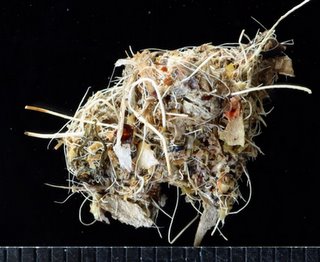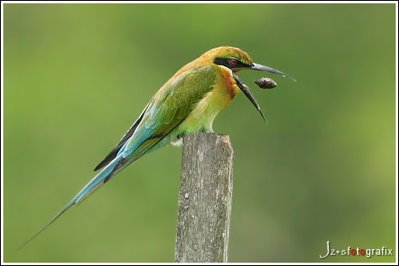 A few weeks ago I picked up a small, 14 x 14 mm piece of dry, compressed pellet on my driveway. On examining it under the hand lens, I found that it was composed of short pieces of fibres, a few sand grains, pieces of what looked like coloured palm fruit skin and other unidentified materials.
A few weeks ago I picked up a small, 14 x 14 mm piece of dry, compressed pellet on my driveway. On examining it under the hand lens, I found that it was composed of short pieces of fibres, a few sand grains, pieces of what looked like coloured palm fruit skin and other unidentified materials. My immediate conclusion was that it must have been regurgitated by a bird perched on an overhanging ceram palm (Rhopaloblaste ceramica) frond.
Could it actually be a pellet regurgitated by a bird? My knowledge of pellets then was confined to those compressed, undigested bones, hairs, feathers, etc that owls and other raptors regularly regurgitate. But then, pellet casting by non-raptors? By insectivorous birds? By frugivorous birds even?
Intrigued, I looked up the literature. Yes, the literature is flooded with reports on pellet casting by raptors. However, there are also a number of reports of pellet casting by birds that regularly consume fish, insects, caterpillars, etc.
Now, why do birds that are not birds of prey need to cast pellets? Fish-eating birds swallow bones that are removed as pellets. Among the contents of these pellets can be found otoliths, those hard inner-ear bones that can help identify the species of fish consumed. Insect-eating birds need to spit out the hairs of caterpillars and the exoskeletons of insects, for example.
When a bird takes in its food, this is normally passed directly down into the stomach. Here, enzymes, acids and mucous are produced and the process of digestion begins. The food is then passed on to the second part of the stomach, the gizzard, where the soluble parts are ground and passed through to the intestines. The indigestible part of the food is compressed into a pellet by the gizzard, thus taking the shape of the gizzard. This pellet will eventually be regurgitated.
Local birders are familiar with pellets regurgitated by raptors. But most are unfamiliar with pellet casting by other birds. But this is a common occurrence in many groups of birds. In fact the International Bird Pellet Study Group listed 18 orders comprising 67 families and 316 species of birds that indulge in pellet casting. And this was as far back as 1979. Birds that cast pellets include crows, cowbirds, grackles, cormorants, grebes, gulls, terns, swallows, sanderlings and rails.
My only encounter with pellet casting was when I tried to photograph a Blue-tailed Bee-eater (Merops philippinus) perched on my neighbour’s TV aerial. The bird suddenly opened its beak and made some sort of retching action. It must have regurgitated a pellet. As the bird eats mainly insects, the pellet must have been made up mainly of insects’ exoskeletons composed on indigestible chitin. Like scats, you can tell what the birds have been eating by examining their pellets.
Now coming back to the pellet I picked up. I am still wondering what bird spitted it out? And whether it was an insect-eater or a fruit-eater?
Text and image by YC, scale in mm.
Latest: After the above was posted, we received a note from Cheong Weng Chun who wrote: "Yes, non-raptors do regurgitate. I only know about this a few months ago when two nature photographers stumbled upon a bee-eater with its beak open wide and suddenly a pellet dropped out. They even sent me a sample of the pellet. However, due to my busy schedule at work and the heat inside my car (yes, I kept it inside my car for a couple of days), it was subsequently smashed accidently. But yes, I did see the exoskeleton of insects especially wing parts."
We also received from Jianzhong Liu an image of a Blue-tailed Bee-eater regurgitating a pellet, an act he saw a few times and was lucky to get a shot of it. The image is reproduced below.
Thank you Weng Chun and Jianzhong for your feedback.

I once saw a female Asian Koel (Eudynamys scolopacea) regurgitate something. Upon closer inspection I found that it was not a pellet, but the seed of Custard Apple.The bird did this thrice, each time regurgitating a single seed. Just thought I'd share.
ReplyDeleteThanks nandita for your most interesting observation. An earlier posting reports on the regurgitation of seeds by koels in Hong Kong. But this is the first I have heard of a koel casting custard apple seeds.
ReplyDeleteToday we discovered about 45 small (0.375 X 0.675-inch) pellets composed of parts of sunflower seed hulls and seed bits at the base of our feeder. This is the first time I have witnessed this type of pellet deposited in my 50 years as an ornithologist. I suspect they were from purple finches (Carpodicus purpureus) that dominated the feeder yesterday. Has anyone else recorded such behavior by seed-eating birds?
ReplyDeleteSorry no. Not from this part of the world.
ReplyDeleteHowever, if you have an image of the pellet, can you please send it to wee37@starhub.net.sg ?
ReplyDeleteWe would love to post it in our new blog at http://besgroup.talfrynature.com/